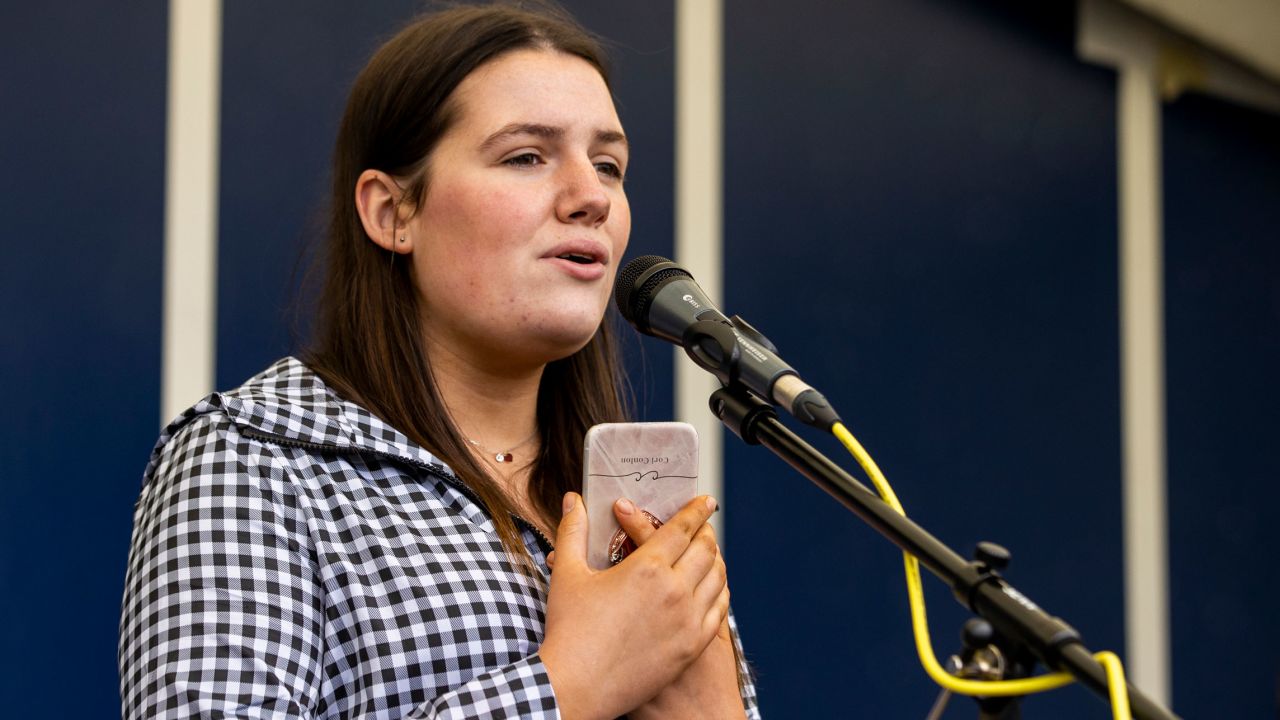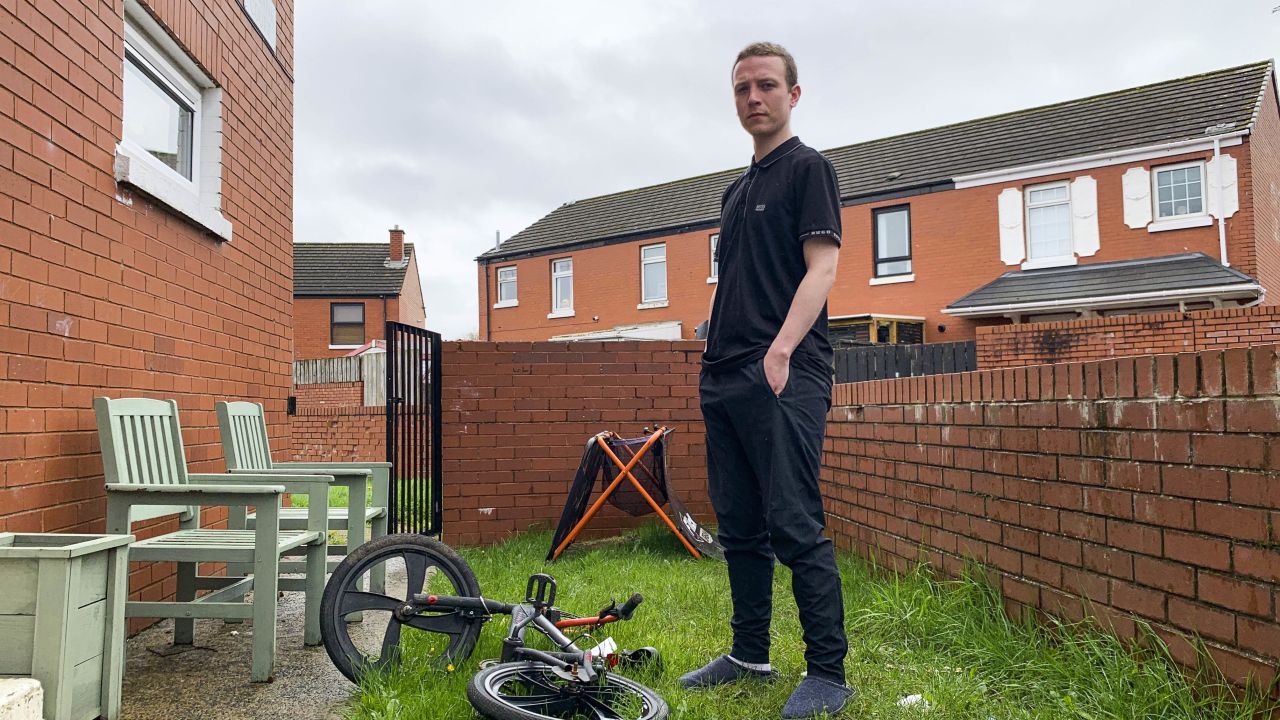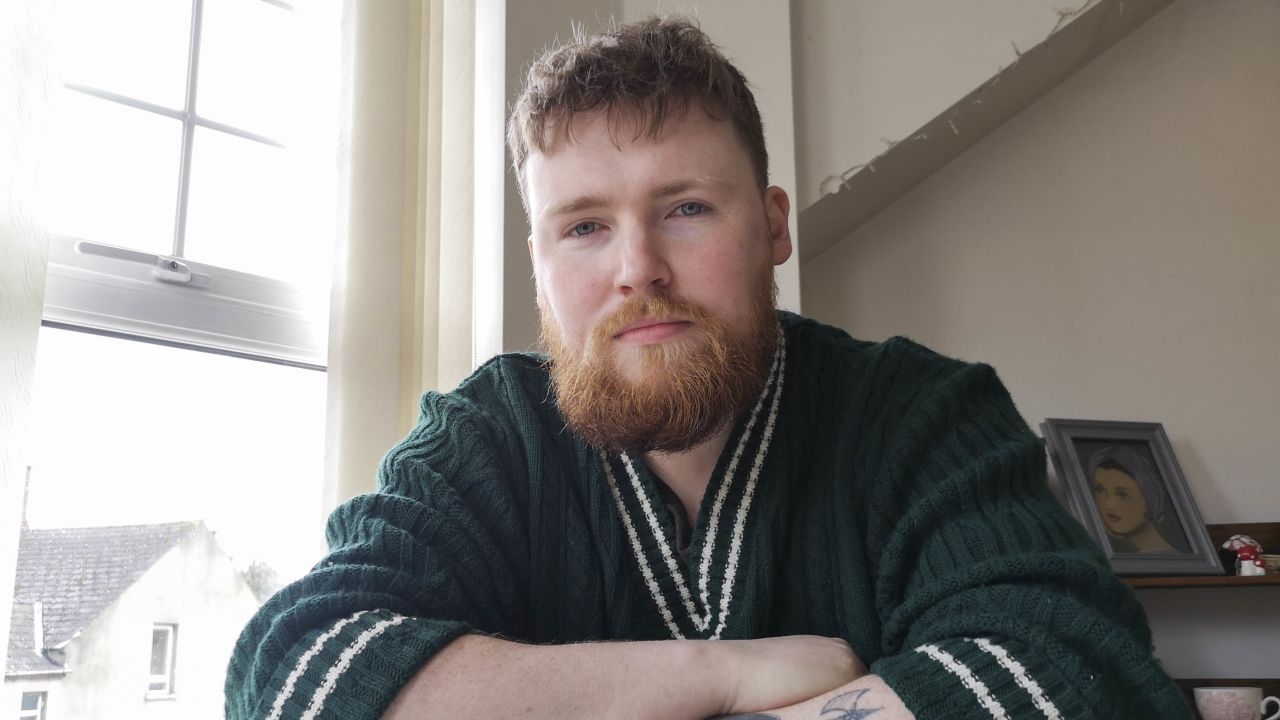Belfast
CNN
—
Cori Conlon grew up thinking Protestants were “the bad guys.”
They went to different schools, played different sports, had different flags, and sang different songs. She said she was oblivious to the complexities of Northern Irish politics, but knew only one thing: to stay away from the Protestant children living at the bottom of the street.
Raised in a predominantly Catholic area in west Belfast, she spoke Irish, sang Irish ballads and attended Irish Catholic school. Her routine was punctuated by “peace walls,” the towering metal barricades built during the conflict that separate communities into Catholic and Protestant. .
Her views were shaped by the folklore of her family, tales that her “Great Granny Kitty” would tell of the violence between Catholic nationalists and Protestant unionists, or the British Army, known as the Troubles, that racked daily life for 30 years and left more than 3,600 people dead.
In 1971, her grandparents provided a safe-haven to neighbors after the British army shot and killed 10 people in their district, a series of incidents known as the Ballymurphy massacre, she said. That and other stories left their mark on her.
She didn’t meet a Protestant until she was 11.

Conlon is one of Northern Ireland’s “peace babies,” those born after the Good Friday Agreement was signed in 1997, ending decades of violence and raising hopes of a brighter future for the next generation. But 25 years on, young people like Conlon are still exposed to the trauma of the Troubles, as clashes over identity and constitutional issues continue to dictate political discourse.
The anniversary of the agreement comes as the power-sharing system of government it created, designed to end decades of violence, is failing. The Democratic Unionist Party (DUP) collapsed the government in protest against the Brexit settlement, which it says drives a wedge between Northern Ireland and Britain. Meanwhile, Sinn Fein, a political party dedicated to Irish reunification, is now the most popular across the island of Ireland.
Caught in the middle of this constitutional tug of war are young people, whose minds are preoccupied with pressing social issues: a largely segregated education and housing system, poor health care and high levels of poverty. CNN spoke with three “peace babies” living in Belfast, who dream of living in a future free from sectarianism, and say that political discord is stifling their futures.
“I grew up in a segregated society, in my own community. I went to an Irish primary school and an Irish Catholic secondary school. I thought Protestants were the bad guys – because that’s what you were told – through history, parents and the murals you see in your area,” Conlon, 22, an Irish-language campaigner who works in theater, told CNN.
But Cori’s perception of Protestants began to change when she joined a cross-community performing arts project, learning to act and sing with young people from the other side of Belfast.
“If it wasn’t for the Rainbow Factory, I wouldn’t have met a Protestant until I was an adult. Now as an adult, because of the Rainbow Factory, I have a lot of friends from all communities, but still anytime I go to east Belfast my parents are traumatized,” she said. “The older generations have not healed, and that’s why it keeps getting passed on to the younger generation.”
Like many others in her generation, Conlon emigrated from Northern Ireland, moving away to study drama in England. But unlike the 88% of young people who never return home – she moved back to Belfast.
Now, she works for YouthAction Northern Ireland, teaching theater to children from Protestant and Catholic backgrounds at the Rainbow Factory, the same performing arts school that she said opened her eyes to the fissures within Northern Ireland’s society. An advocate for better peace and reconciliation, she is adamant that another generation is not condemned to the same fate of sectarianism.
Joel Keys, a 21-year-old loyalist activist from east Belfast, lives on the other side of the peace walls, where many curbs are still painted in the colors of the British Union Jack flag – red, white and blue – to mark out unionist territory.
Many of the loyalist murals in the area were painted by his father. One pays homage to the east Belfast Protestant Boys Flute Band, who march through the streets of the city every year on July 12, celebrating the anniversary of the Battle of the Boyne in 1690, when King William of Orange secured a victory over the deposed Catholic monarch James II – leading to the discrimination of Irish Catholics for centuries. The streets are lined with murals showing men wearing balaclavas pointing guns, with the words: “if you are attacked, defend yourself.”
“There were no Catholics in my area or school. For most of my life, I thought, we are the good guys – and all of them Catholics were evil, scary and wanted to kill us,” Keys told CNN. “But it’s not that young loyalists are running around with a hatred of Catholics in their hearts.”
These divisions are reinforced throughout society. Across Northern Ireland, 93% of children go to a school that is segregated by religion, per a UNESCO report from Ulster University in 2021. And more than 90% of social housing estates remain segregated into single identity communities, with that number rising to 94% in Belfast, according to 2016 figures from the Housing Executive.

In 2021, unionists held rallies and marches to protest the Northern Ireland protocol – recently rebranded as the “Windsor Framework – part of the Brexit deal that saw the United Kingdom leave the European Union, leading to a customs border in the Irish Sea in order to avoid having one across the island of Ireland. Loyalists’ anger boiled over and spilled into the streets. Adults cheered on children as they threw petrol bombs at police. Eight people were arrested for rioting, including Keys.
The teenage supermarket worker-turned aspiring politician was released from jail after his arrest, and shortly after was invited to appear before the Northern Ireland affairs committee to discuss loyalist anger. He stunned members of the Northern Ireland Assembly, known as Stormont, and faced media backlash, after claiming that sometimes violence is “the only tool you have left.”
But he has since spoken out against the renewed loyalist violence in his area, saying those who have accused him of supporting it misunderstood him.
“The Northern Ireland Protocol is interesting because I think loyalism has a point – and I think there’s a legitimate argument to be made that a customs border between Northern Ireland and Britain – similar to the way a border across the island, is wrong. But is it the case that these are the issues that people in my community are discussing? No. If you went out and did a survey and asked people in loyalist areas what is the Protocol – I’d be willing to bet that over half of them wouldn’t be able to tell you – there’s more important issues,” Keys told CNN.
More than anything, Keys is furious at how the current political impasse has left the people of east Belfast in poverty, adding that leaders of the Democratic Unionist parties need to understand that the new generation want better jobs and education, not the same tired sectarian politics pitting orange (Protestant) against green (Catholic).
“People in my community, they’re not lazy or stupid – so why are they stuck in the position they’re in? Why are they struggling to find employment? Why are some of them struggling to find a house?” Keys queried. “Because our schools have failed, and our political system is failing. But instead of addressing these problems, people are still in war mode. The Good Friday Agreement may have taken away the bombs and the bullets, but all this means is that we’re now at war with our words instead.”
In 2012, there were loyalist riots when the number of days that the Union flag flies over Belfast City Hall was limited from 365 days a year to 18 — the minimum required for UK government buildings. Protesters, angered over what they saw as an attack on British culture, threw petrol bombs, bricks and stones at police, burning the offices of political parties that voted for the decision.
“I remember running down to Belfast city center with my friends to riot. I picked up a bin and threw it. I looked across the street and saw a woman looking at me, an ordinary person going about their day. She was so appalled at what was going on – and I remember thinking, what am I doing?” Andrew Clarke, a 27-year-old Protestant from east Belfast, told CNN.

Clarke said that his identity at the time was firmly rooted in unionism, born out of his childhood and nurtured in a Protestant state school.
But at 16, after the 2012 riots he said his view of the issues facing his generation shifted dramatically when he changed schools from a Protestant state school to an integrated college. The move opened his eyes to other, more pressing issues, which he says he feels aren’t represented adequately by politicians today.
“I was a supporter of LGBT rights and abortion access for women, but the DUP opposed that. Growing up in a loyalist area, I’ve seen how loyalist communities are controlled by unionist politicians who don’t care about them – who use the constitutional question to ignore social issues, where social deprivation is tolerated because politics is seen as green and orange,” Clarke said, adding that he now aligns more with Irish Republicanism.
“There is a cost-of-living crisis, homelessness crisis and Belfast is the suicide capital of western Europe. There is nothing here for young people – so they flee abroad.”
In 2022, after the latest round of rioting subsided, the Democratic Unionist Party collapsed the power-sharing deal designed to stop the bloody conflict, in protest over the Northern Ireland protocol. It is the fifth time since the Good Friday Agreement was signed that sectarian politics has left the Northern Irish people without a government.
Without a body to allocate funding, Youth Action Northern Ireland, which runs the Rainbow Factory, may be forced to close some of their cross-community projects, one less opportunity for Catholic and Protestant children to meet, according to Conlon.
Northern Ireland has the highest levels of child poverty per head of population in the UK, with 100,000 born into poverty, according to the Joseph Rowntree foundation. And, last week, Northern Ireland’s Department of Education announced that they were scrapping Holiday Hunger, a free school meal program, and a school counseling scheme due to budget cuts.
“Youth organizations are crying out for government support. There’s funding there that can’t be given out – because there’s no government – and these youth services are going to close. Young people rely on it so much. I honestly can’t even begin to imagine the impact this will have on their lives,” Conlon said.
“It feels like all these issues are more important than sectarian politics – but it feels like if we don’t address sectarianism – then we can’t deal with these issues.”

